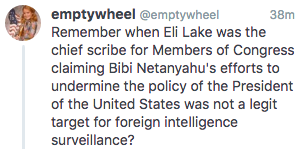The Predictable Result of Asymmetry in Terrorism Policing: Andrew McCabe’s Demise
I recently finished Andrew McCabe’s book.
It is very effective at what I imagine its intended purposes are. It provides some fascinating new details about the genesis of the Russian investigation. It offers a great introduction in how the FBI (at its best) can work. It gives a self-congratulatory version of McCabe’s career, including key events like the Najibullah Zazi and Boston Marathon investigations; even if McCabe had wanted to tell fully honest stories about those investigations, I’m sure the less flattering details wouldn’t have passed FBI’s publication review.
The book also says satisfyingly mean things about Trump, Jeff Sessions, and (more obliquely) Rod Rosenstein. (I think McCabe’s book release significantly explains the rumors reported as fact that Mueller’s report was imminent some weeks ago; that claim served, in part, to once again eliminate any pressure to fire Rosenstein immediately).
The latter of two, of course, implemented McCabe’s firing. McCabe’s excuse for lying to the Inspector General, which led to his firing, is one of the least convincing parts of the book (he admits he can’t say more because of his continued legal jeopardy, but he does raise it). That’s true, in part, because McCabe only deals with one of the conversations in question; there were a number of them. But he also excuses his chief lie because he was frazzled about learning of the Strzok-Page texts in the same conversation. I can understand that, but elsewhere, one of his digs against Rosenstein is how overwhelmed the Deputy Attorney General was in the wake of the Jim Comey firing. McCabe suggests, in that context, that because he had dealt with big stressful issues (like the Boston Marathon attack), he wasn’t similarly rattled. Which is why I find it disingenuous to use being frazzled for not being fully truthful to the Inspector General. Plus, virtually all defendants prosecuted for lying to the FBI (including George Papadopoulos, but not Mike Flynn, who is a very accomplished liar) are frazzled when they tell those lies; it’s a tactic the FBI uses to catch people unguarded.
I was most frustrated, however, by something that has become increasingly important in recent days: McCabe’s utter lack of awareness (at least in the book) of the import of the asymmetric focus on Islamic terrorism across his career.
After moving to counterterrorism in the mid-00s from working organized crime, McCabe became an utterly central player in the war on Islamic terror, founding the High Value Interrogation Group, and then leading the CT and National Security Divisions of FBI. He was a key player in investigations — like Zazi — that the FBI is rightly proud of.
But McCabe normalizes the choices made after 9/11 to pursue Islamic terrorism as a distinct danger. He (of course) whitewashes Jim Comey’s decision to retain the Internet dragnet in 2004 under an indefensible use of the PATRIOT Act. He argues that it is politically impossible to survive a failure to prevent an attack even though he managed the Boston Marathon attack, where FBI and NSA had some warning of Tamerlan Tsarnaev’s danger, but nevertheless got very little criticism as a result. Most remarkably, McCabe talks about Kevin Harpham’s attempted attack on the Martin Luther King Day parade, mentions as an aside that this was (obviously) not an Islamic terror attack, but offers no reflection on how Harpham’s attack undermines much of what he presents, unquestioningly, as a greater risk from Islamic terrorism (here’s a story on how Barack Obama did not get briefed on Harpham, a decision that may well have involved McCabe).
Granted, McCabe’s blind spots (at least in the book) are typical of people who have spent their lives reinforcing this asymmetry. You see it, too, in this utterly nonsensical paragraph in a largely ridiculous piece from Joshua Geltzer, Mary McCord, and Nick Rasmussen — all likewise accomplished players in the War on Just One Kind of Terrorism — at Lawfare.
The phrases “international terrorism” (think of the Islamic State and al-Qaeda) and “domestic terrorism” (think of the Oklahoma City bombing and the October 2018 shooting at a Pittsburgh synagogue) have often been a source of confusion to those not steeped in counterterrorism. The Islamic State has its roots internationally, but what makes it such a threat to Americans is, in part, its ability to influence domestic actors like Omar Mateen to kill Americans in domestic locations like Orlando, Florida. The group may be “international,” but its attackers and attacks can be, and have been, domestic—to tragic effect.
This paragraph, in a piece that admits the focus of their career has been wrong (and neglects to mention that Christchurch terrorist Brenton Tarrant named Donald Trump, along with Anders Behring Breivik, as an inspiration), suggests that the reason international terrorism is “such a threat” is because it can inspire domestic actors. The logic inherent to that paragraph is that terrorism carried out by “domestic terrorists,” inspired by a domestic white supremacist ideology is any less dangerous than terrorism carried out by people inspired by what is treated as an international ideology. International terrorism is worse than domestic terrorism, these experts argue, because it can lead to domestic terrorism.
Dead is dead. And given the significant number of white supremacists who have had experience in the military and greater tolerance for their training, white supremacists have the potential of being far more effective, as individuals, at killing than US-based Islamic terrorists.
One thing the Lawfare piece studiously avoids acknowledging is that what it calls “domestic” terrorism (the racist ideology of which they never describe) is an ideology significantly exported by the United States. Even in a piece that rightly calls for an equal focus on both white supremacist terrorism and Islamic terrorism, it ducks labeling the ideology in question. And while this WaPo piece does label the ideology in question, it bizarrely calls an attack in New Zealand carried out by an Australian a “domestic” attack.
The WaPo piece describes one problem with the asymmetric treatment of different kinds of terrorism: that governments don’t share intelligence about international violent racist ideology. In fact, in the US, such intelligence gets treated differently, if the FBI’s failure to track the networks around Frazier Glenn Miller and Eric Rudolph is any indication.
Ironically, that’s one reason that McCabe’s failure to track white supremacist terrorism in the same way he tracked Islamic terrorism led to his demise. While the network behind the election year operation that helped elect Trump involves a lot of Russians, it also clearly involves a lot of white supremacists like Nigel Farage (and David Duke), a network Russia exploited. Additionally, as I have argued (and at least one study backs) white supremacist networks provided the real fire behind the attacks on Clinton; Russia’s information operations had the effect of throwing more fuel on a blazing bonfire.
The other problem with the US government’s asymmetric treatment of terrorism is legitimacy. Labeling Islamic terrorism “foreign” and pursuing material support cases based partly on speech has had the effect of criminalizing some speech that criticizes US foreign policy, even well-deserved criticism about the effect of US killing of Muslims. By contrast, white supremacist speech, even that which more aggressively advocates violence is treated as speech. Yes, deplatforming has begun to change that.
But we’re still not at a place where those who incite white supremacist violence are held accountable for it.
That’s how it was possible for a man to kick off a campaign by inventing lies about Mexican immigrants and how the entire Republican party, up to and including the new supposedly sane Attorney General, are permitted to pursue counterproductive policies solely so they can appear to demonize brown people.
Irrespective of the merit or not in the finding that Andrew McCabe lacked candor with the IG, he got treated the way he did because a man whose entire political career is based off feeding white resentment needed to appear to be a victim of Andrew McCabe. That act, by itself, was not about Trump’s white supremacist ideology. But it is a structure of power that is white supremacist (exacerbated by Trump’s narcissism).
We have a President Trump in significant part because this country has tolerated and even rewarded white supremacist ideology, institutionally ignoring that it poses as much of a risk as violent Islamic ideology. It would be really useful if people like Andrew McCabe spend some time publicly accounting for that fact.
The white supremacy that brought us the Trump presidency would not be possible if we had treated violent white supremacist terror as terror for the last twenty years.



